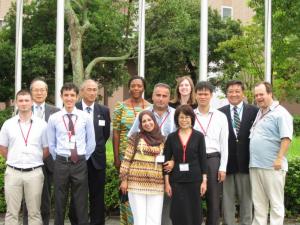Home > Workshop and Training > IN JAPAN > Fiscal Year 2011 > FY2011 JICA Training Course Starts on "Pollution Control and Local Environment Management"
Main content starts here.
Update:August 30, 2011
FY2011 JICA Training Course Starts on "Pollution Control and Local Environment Management"
 ICETT started a fiscal year 2011 JICA Training Course on "Pollution Control and Local Environment Management" from August 25 (Thur.) to October 5 (Wed.). The 42-day course is being attended by eight participants from seven countries: Algeria, Brazil, Ghana, Moldova, Tajikistan, Macedonia, and Vietnam.
ICETT started a fiscal year 2011 JICA Training Course on "Pollution Control and Local Environment Management" from August 25 (Thur.) to October 5 (Wed.). The 42-day course is being attended by eight participants from seven countries: Algeria, Brazil, Ghana, Moldova, Tajikistan, Macedonia, and Vietnam.
1, Background and Objectives
Since the first edition of ISO 14001, the Environmental Management Systems (EMS) standard, was published in 1996, major enterprises and businesses across the world have voluntarily embarked on environmental management with their eyes set on entering into the international market, widely adopting the concept of the PDCA (plan-do-check-act) cycle as a means to improve their operation.
However, industrial pollution in developing countries is caused mainly by small and medium-sized companies and factories, which don’t comply with the EMS standards. In addition, not only the industrial pollution but also untreated household waste, such as wastewater and other waste products, has become a considerably serious issue, as areas suffering from severe pollution have expanded due to a growing concentration of the population in cities and their surrounding areas.
Despite the fact that basic environmental laws have been established in developing countries, these nations recognize that they haven’t been able to contribute to the protection of the environment since they have difficulties in enforcing the laws. Especially in local cities where industries are based, governments haven’t effectively used their authority to manage the environment because of a lack of funds and human resources.
The course is intended for government officials from developing countries that suffer from various kinds of pollution, in particular water pollution, to learn about practical methods to manage the environment, especially water quality. Local officials responsible for environmental administration learn about methods to encourage polluting factories in their areas to pay more attention to pollution control, and to draw up and implement plans to improve their control measures.
2, Training Methods and Details
Understanding of Current Pollution Issues
Details (lectures and field trips)
- 1)Presentations of inception reports (with a question and answer session)
- 2)Japan’s history of pollution and solutions to those pollution problems
- 3)Japanese pollution control laws: the Air Pollution Control Law, the Water Pollution Control Law, and the Soil Contamination Countermeasures Law
- 4)Field trips to air and water quality monitoring facilities
Environmental Improvement and Management
Details (lectures and field trips)
- 1) Technology to improve pollution control and environmental conservation: measuring technology, EOP (end of pipe) technology, and CP (cleaner production) technology
- 2) Efforts by local governments regarding pollution control and environmental conservation: the Area-wide Total Pollutant Load Control System, emission standards by industry (including the More Stringent Prefectural Standards and local effluent standards for substances not regulated by the national standards), the Environmental Impact Assessment System, the Pollution Control Manager System, the Pollution Control Agreements, and various types of preferential treatment, subsidies and awards
- 3) Efforts by companies: cases of voluntary environmental management, the application of EOP and CP technologies, information disclosure, and corporate social responsibility (CSR) activities in small and medium-sized enterprises (SME), and light industries including the food industry
Enhancement of Local Environmental Management Abilities
Details (lectures and field trips)
- 1) Lectures on domestic and industrial waste disposal and visits to disposal-related facilities
- 2) Lectures on domestic wastewater disposal and visits to related facilities
- 3) Local water quality management of rivers
- 4) Activities by local governments to promote awareness of environmental protection
- 5) Exchange of opinions and views with civic groups, such as nonprofit organizations, about voluntary activities to improve the environment
Summary of the Course
At the end of the training, the participants make presentations of action plans to be pursued back in their countries, including what needs to be improved and the best use of the knowledge and technology they learn about in this course.
(Taniguchi)







